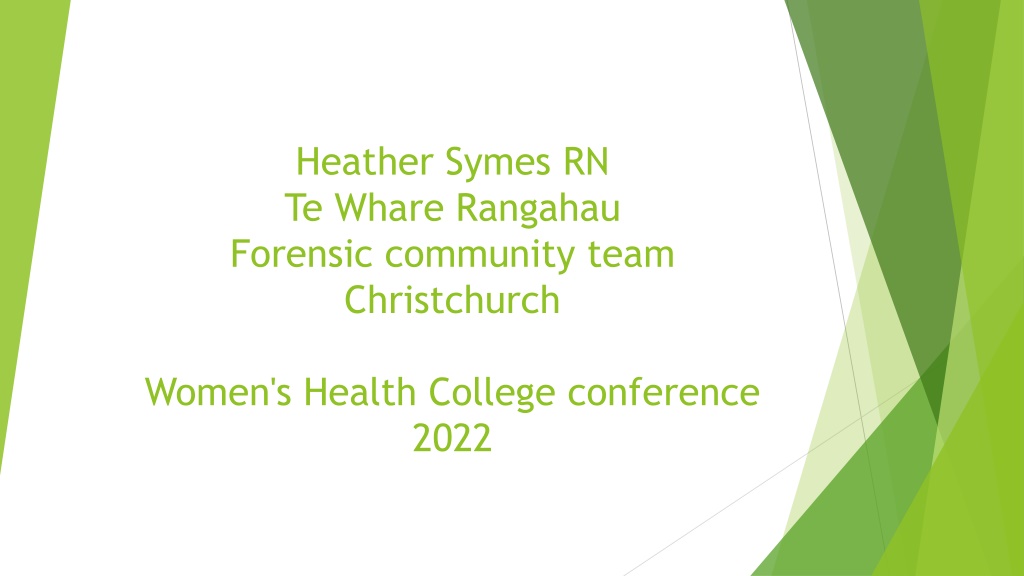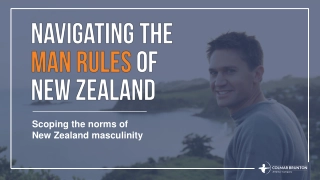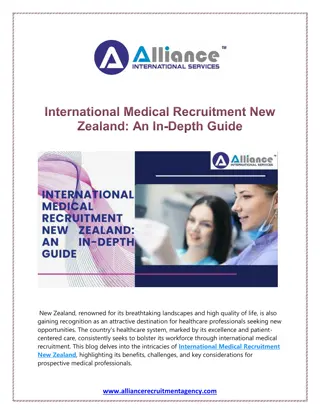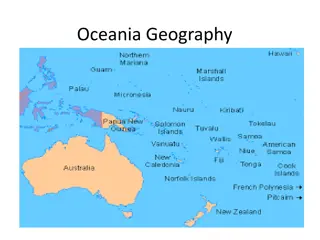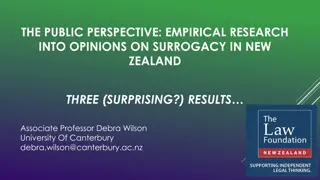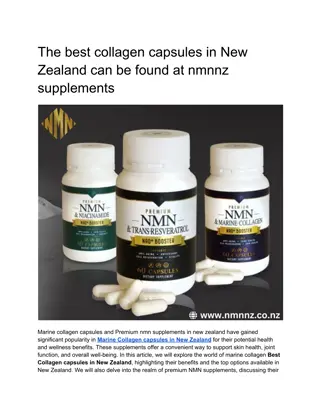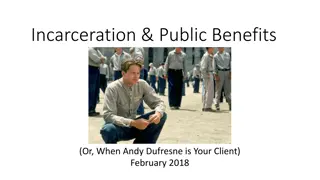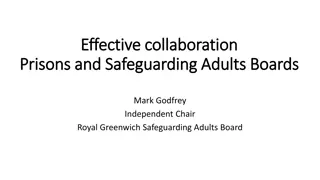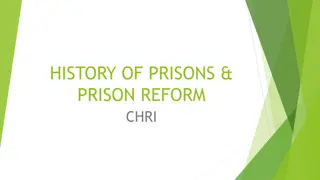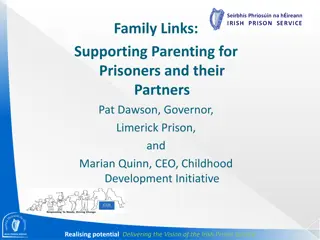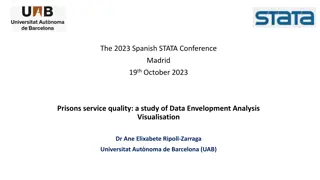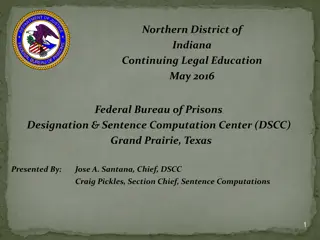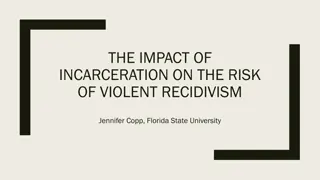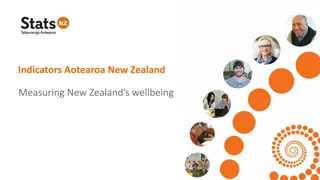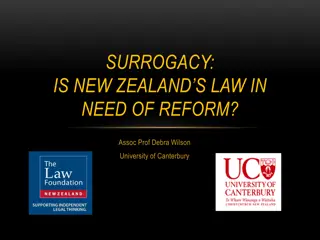Understanding Women's Incarceration in New Zealand Prisons
Explore the challenges faced by women in forensic psychiatry, the determinants of women's incarceration, and the initiatives like the Mothers with Babies Unit in New Zealand prisons. The presentation sheds light on the impact of trauma, family violence, and mental disorders on female inmates, aiming to provide insights into empowering and supporting women in the prison system.
Download Presentation

Please find below an Image/Link to download the presentation.
The content on the website is provided AS IS for your information and personal use only. It may not be sold, licensed, or shared on other websites without obtaining consent from the author. Download presentation by click this link. If you encounter any issues during the download, it is possible that the publisher has removed the file from their server.
E N D
Presentation Transcript
Heather Symes RN Te Whare Rangahau Forensic community team Christchurch Women's Health College conference 2022
"Our Wahine, their future" Aim: To provide an overview of Women in Forensic Psychiatry who are resident in NZ prisons. Female mental disorder Secure places? Mental disorder in Prisons Trauma & Family Violence
INCARCERATION of Women has fundamental determinants Loss of relationships, homes and whanau/pipi/friends Loss of social and financial influence and stability Discrimination re roles/ jobs /disability Loss of self esteem/identity Shame and isolation from whanau/family Exposure to mental unwellness/physical abuse/isolation Lack of empowerment/mana Trauma and abuse Nature / Nurture
Women's prisons in NZ NUMBER OF PRISONERS IN EACH LOCATION BY CUSTODY STATUS AS AT 31 MARCH 2021 There are three women's prisons in New Zealand. Auckland Region Women's Corrections Facility (ARWCF) in Wiri, Manukau City has 286 beds. Arohata Women's Prison in Tawa, north of Wellington has 88 beds. Christchurch Women's Prison, 20 km south of Christchurch has 140 beds. Prison\Corrections Facility Total Female Prisoners Arohata Prison Auckland Region Women's Corrections Facility Christchurch Women's Prison Remand Prisoners Population % 252 49 6.3% 1.2% 175 4.1% 28 1.0%
Male and female prison population March 2022 trend
March 2022 women in NZ Prisons Total Female Prisoners Arohata Prison Auckland Region Women's Correctio ns Facility Christchu rch Women's Prison 209 210 419 7 426 5.6% 47 43 90 1 91 1.2% 122 124 246 5 251 3.3% 40 43 83 1 84 1.1%
New Beginnings - Mothers with Babies Unit What is the Mothers with Babies Unit? The Mothers with Babies Unit gives you a unique opportunity to be with your child, and get the help you need to make positive changes and stay offence free when you are released. You get to care full time for your child in a safe and supportive environment with wrap-around services to support you in your parenting. Placement will be in the best interests of the child. What s best for baby Your child deserves the best possible start in life. The Mothers with Babies Unit offers you and your baby: a stable, safe environment a chance to grow your relationship support from experienced, caring staff support from skilled outside providers access to rehabilitation and reintegration programmes. Other solutions If having your baby with you in prison is not the best choice for you both, there are ways we can help you to stay in touch and grow your mother/baby relationship. You can use special bonding facilities on site where you and your child can regularly spend time together for bonding purposes. Where are the Mothers with Babies Units? Our three Mothers with Babies Units are in Auckland Region Women s Corrections Facility, Arohata Prison (Wellington) and Christchurch Women s Prison.
If you join the programme, we will try to place you near family, whanau and other significant people in your baby s life. The aim is to help you grow positive relationships with others who can support you in your parenting once you are released.
Criteria for Mums You may be eligible to apply for Mothers with Babies if: you are pregnant and will give birth before your release from custody you have a child who is younger than 24 months, and you were their main caregiver before you were imprisoned OR you are likely to be their primary caregiver on release you have no convictions for sexual or violent offences involving children. You must be: drug free and have no serious misconducts motivated to live in the unit and care for your child willing to be assessed to ensure that the decision to care for your child in prison is a safe and appropriate option.
Offence type prisoners may be convicted of offences across multiple categories'.
Some Key Statistics 62% of women in prison have had both (comorbid) mental health and substance disorders across their lifetimes. 52% of women in prison have suffered post traumatic stress disorder across their lifetime. 44% of women in prison have experienced drug dependence disorders across their lifetime 68% of women in prison have been the victim of family violence 66% of women in prison are Maori 46% of women in prison have a lifetime alcohol dependence 75% of women in prison have had a diagnosed mental health condition in last 12 months 46% of women in prison are on remand
Key statistics continued 66% of women in prison are Maori. Women on Community Sentences 19% of total number of people on Community sentences are women 54% of those are Maori. NZ is a world leader in imprisoning our indigenous population. NZ Population 17% are Maori!
Common mental health disorders of women in CHC Women's prison Anxiety, PTSD, OCD, Sexual abuse histories. Depression, Dysthymic disorder Bipolar disorder, Schizophrenia disorder ,psychotic episodes Methamphetamine, Synthetic dependence THC, Nicotine & Alcohol abuse Past physical and psychological abuse, trauma
Realities of being in prison in NZ 2021 One woman struggled to change her sanitary pad with handcuffs on. Another was made to shower with chains on and the door ajar. Several were forced to give birth with Corrections officers present and chatting among themselves in the room, including one woman who had four officers present. Another was placed in the back cage of a transport van while heavily pregnant, despite protesting about the danger to her and her baby. The Children s Commission gave these practices a red detrimental classification, the worst possible, saying they actively caused harm and were negligent. It recommended the urgent review and clarification of policies relating to pregnant, labouring and postnatal prisoners.
Yet multiple incidents are detailed in a 2019 report undertaken by the Office of the Children s Commissioner into the Mothers with Babies Unit (MBU) at Auckland Region Women s Corrections Facility, obtained by Stuff under the Official Information Act. The visit is facilitated by the Ombudsman s office as part of its role to uphold the United Nations Optional Protocol to the Convention against Torture and Other Cruel, Inhuman or Degrading Treatment or Punishment (OPCAT.)
Michelle Duff May 09 2021 NZ Stuff article Women are being forced to give birth in handcuffs, with prison officers in the room Women are being forced to give birth in handcuffs, struggling to feed their new babies while they are shackled, and being made to labour with Corrections officers in the room. Michelle Duff investigates the reality for incarcerated pregnant women. The woman only had her handcuffs removed for a moment. In the final stages of labour, when the contractions were at their peak, she was allowed to have them taken off. Straight after she had given birth, the prison officer shackled the woman again. She had her first shower with cold steel around her wrists. When a doctor asked that they be removed, the officer turned to them. I don t tell you how to do your job, so don t tell me how to do mine. Her midwife sought special permission for the woman to be unchained from the bed so she could have skin-to-skin contact with her new-born.
Misunderstanding by staff led to Mothers and Babies unit at Prison being unoccupied for 8yrs Stuff article 12/05/2022 reported Wellington Women's Prison M & B Unit empty for 8yrs due to safety concerns with building and position of building. Office of Children's Commissioner (OCC) report in 2020 released this month. Mums locked up for 21/24hrs day. Denied extra food when pregnant and hungry No opportunity to be with children unless they moved to CHCH or Auckland women's prison, often away from whanau/family/support. Continued punishment and abuse of pregnant Women in prison Is this what we really want to happen in NZ?
Information sources for this slide show Stuff newspaper articles May 2022 www. Corrections.govt.nz/resources/strategic_reports Office of Children's Commission Reports -online Own experiences of working with Women at CHCH Women's Prison McIntosh T. (2017). Behind the wire: Maori women and prison Womens studies Journal,31(1),114-116 Hokai Rangi overarching organisational strategy 2019 Indig, D., Gear,C., and Wilhelm,K,. Comorbid substance use disorders and mental health disorders among NZ prisoners, NZ Dept Corrections 2016 Women rising above a new Horizon Women's Strategy 2021-25 DoC
